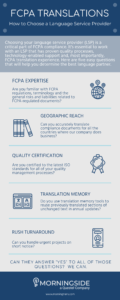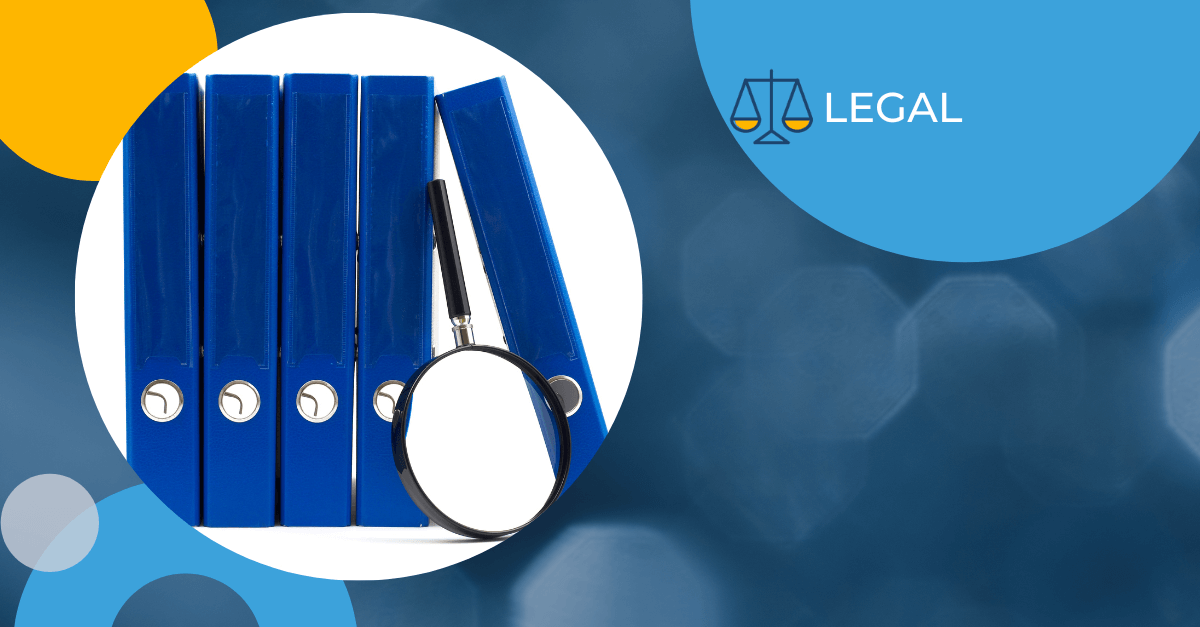FCPA Compliance
More law firms are expanding internationally, meaning there is a growing need for talented legal translators and multilingual support for global casework. To protect your business or law firm in this heightened era of corruption awareness, it’s critical to comply with the far-reaching United States Foreign Corrupt Practices Act (FCPA) federal enforcement of anti-bribery and corruption requirements.
All businesses must prove compliance with FCPA related to their foreign operations, which requires translating corporate compliance documents and policies into various languages for overseas employees and offices.
Translation’s Role in FCPA Compliance
The importance of translating these policies clearly and accurately should not be underestimated. U.S. companies with offices or employees located overseas must provide those workers with compliance training programs that explain FCPA rules and obligations in their native language. Distributing English-only policies instead of professional translations can seriously backfire if bribery or corrupt behavior occurs abroad.
The need for translations related to FCPA has grown substantially in recent years. Accurate translations and a commitment to compliance are critical parts of maintaining a corruption-free global workforce. For law firms defending their clients during an FCPA investigation, hundreds and possibly thousands of foreign language documents may need to be translated. The cost of translating these documents can be exponentially high, and relying on machine translations alone is a risky strategy.
Teaming up with a Language Services Partner
Partnering with a language services partner (LSP) with significant FCPA translation experience should help provide you with strategies for containing costs while ensuring accurate, reliable translations to help you build the most robust case possible. It would be best if you relied on an LSP for FCPA translation that utilizes a multi-pronged approach;
- filtering techniques like foreign language keyword search to remove irrelevant documents from the data set
- machine translations to get the “gist” of what each document contains
- document summaries to determine if a complete translation is needed
- certified word-for-word translation for records that must be clearly understood and submitted to the Department of Justice or SEC.
A multi-stage process for FCPA translation that filters down the cache of foreign language documents not only helps lower costs but also speeds up review time. It’s also critical to use translators that are experts in the field and familiar with local terminology. For example, French words used as slang for bribery or “pay-off” are different in Morocco than in France. The translator should be familiar with these regional differences. To help you select the right LSP for you and your organization, we have created the infographic below:

To ensure your global organization’s employees fully comprehend FCPA compliance, multilingual training should be provided during onboarding. All information should be provided in a legally binding document in their native language– especially if doing business in high-risk countries.
No matter how you look at it, organizations and law firms conducting business in multiple regions will require professional legal translation. Legal translation can present different challenges related to cost and efficiency.
For high volumes of translation work, options including machine translation, online sifting, and document review should all be considered. Overcoming those challenges requires the right mix of technological and human support, all of which the suitable LSP can help guide you through the process.
Should you ever come under investigation, help protect your organization, or clients, by downloading our guide, “Translation: A Key Component of FCPA Compliance an FCPA Whitepaper.” Download our complimentary whitepaper where we discuss:
- How the FCPA impacts your global business
- Translating as a critical component of your compliance program
- Handle large volumes of foreign language documents during investigations
- Morningside’s 4-Step approach for FCPA-compliant translations
- Benefits of using an LSP to handle FCPA translations
Multilingual legal matters are often complex and time-sensitive, requiring an experienced legal translation partner. Entrust your most time-sensitive translations to Morningside’s professional legal translators, each qualified through rigorous tests and evaluations per our ISO-certified QA standards.
You can learn more about our legal translation services and receive your complimentary copy of our new white paper today.
About Morningside
Morningside, a Questel Company, is a recognized leader in comprehensive legal language solutions and eDiscovery services for the legal industry. We provide the world’s largest law firms and corporate legal departments with a full suite of services, ranging from legal document translation, contracts and compliance documentation to full-scale multilingual litigation requiring certified translation and foreign language document review to supporting complex eDiscovery projects. We deliver customized legal document translation solutions based on your case’s size and budget requirements, utilizing industry-leading technology to ensure accuracy, lower costs and faster turnaround times. Find out why 97% of the Am Law 200 and 90+ leading global brands rely on Morningside.



